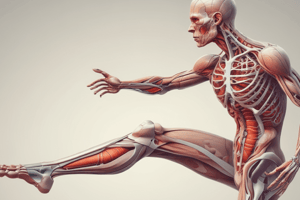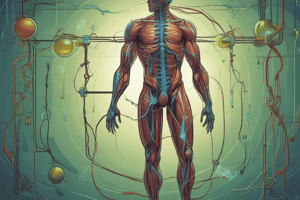Podcast
Questions and Answers
Through a delicate process of combining and breaking links between cations (positively charged molecules) and anions (negatively charged molecules), often referred to as electrolytes, chemical reactions are generated that release energy. The most incredible mobility occurs at the cellular level when fluids and electrolytes are exchanged across membranes to maintain homeostasis, the balance in the body needed to sustain life. While some of these exchanges are passive and flow freely with little effort, other exchanges are active, energy-exhausting processes designed to maintain a critical balance of fluid and electrolytes on each side of the cell membrane and an environment that is appropriately charged with acids or bases to allow essential chemical reactions to occur.
Through a delicate process of combining and breaking links between cations (positively charged molecules) and anions (negatively charged molecules), often referred to as electrolytes, chemical reactions are generated that release energy. The most incredible mobility occurs at the cellular level when fluids and electrolytes are exchanged across membranes to maintain homeostasis, the balance in the body needed to sustain life. While some of these exchanges are passive and flow freely with little effort, other exchanges are active, energy-exhausting processes designed to maintain a critical balance of fluid and electrolytes on each side of the cell membrane and an environment that is appropriately charged with acids or bases to allow essential chemical reactions to occur.
fluid and electrolyte balance
Cells are the basic unit of structure and function of life. Many organisms consist of just one single ______. This ______ performs all the vital functions for that organism. On the other hand, many organisms are multi______ular, including humans, whose bodies are composed of about 70 trillion ______s in their own environment.
Cells are the basic unit of structure and function of life. Many organisms consist of just one single ______. This ______ performs all the vital functions for that organism. On the other hand, many organisms are multi______ular, including humans, whose bodies are composed of about 70 trillion ______s in their own environment.
cell
The ______ is a miraculous machine. It functions, almost totally automatically, to produce energy and motion when supplied with essential fluid, nutrients, and oxygen.
The ______ is a miraculous machine. It functions, almost totally automatically, to produce energy and motion when supplied with essential fluid, nutrients, and oxygen.
human body
The most incredible mobility occurs at the ______ when fluids and electrolytes are exchanged across membranes to maintain homeostasis, the balance in the body needed to sustain life. While some of these exchanges are passive and flow freely with little effort, other exchanges are active, energy-exhausting processes designed to maintain a critical balance of fluid and electrolytes on each side of the cell membrane and an environment that is appropriately charged with acids or bases to allow essential chemical reactions to occur.
The most incredible mobility occurs at the ______ when fluids and electrolytes are exchanged across membranes to maintain homeostasis, the balance in the body needed to sustain life. While some of these exchanges are passive and flow freely with little effort, other exchanges are active, energy-exhausting processes designed to maintain a critical balance of fluid and electrolytes on each side of the cell membrane and an environment that is appropriately charged with acids or bases to allow essential chemical reactions to occur.
Many ______ consist of just one single cell. This cell performs all the vital functions for that organism. On the other hand, many ______ are multicellular, including humans, whose bodies are composed of about 70 trillion cells in their own environment.
Many ______ consist of just one single cell. This cell performs all the vital functions for that organism. On the other hand, many ______ are multicellular, including humans, whose bodies are composed of about 70 trillion cells in their own environment.
What are cations and anions?
What are cations and anions?
What is homeostasis?
What is homeostasis?
What is the basic unit of structure and function of life?
What is the basic unit of structure and function of life?
What is the process that releases energy by combining and breaking links between cations and anions?
What is the process that releases energy by combining and breaking links between cations and anions?
What is the function of the human body as described in the text?
What is the function of the human body as described in the text?
Flashcards are hidden until you start studying
Study Notes
Chemical Reactions and Energy
- Chemical reactions release energy through the process of combining and breaking links between cations (positively charged molecules) and anions (negatively charged molecules).
- This process involves the exchange of fluids and electrolytes across membranes to maintain homeostasis.
Homeostasis
- Homeostasis is the balance in the body needed to sustain life.
- It is maintained through the exchange of fluids and electrolytes across cell membranes.
Cell Structure and Function
- The cell is the basic unit of structure and function of life.
- Cells can be single-celled organisms, performing all vital functions for the organism.
- Multicellular organisms, including humans, are composed of approximately 70 trillion cells.
Cell Membrane and Electrolytes
- Cell membranes facilitate the exchange of fluids and electrolytes to maintain homeostasis.
- This exchange can be passive, flowing freely with little effort, or active, requiring energy-exhausting processes.
- The balance of fluids and electrolytes on each side of the cell membrane is critical for maintaining an environment that is appropriately charged with acids or bases.
Human Body Function
- The human body functions almost totally automatically, producing energy and motion when supplied with essential fluid, nutrients, and oxygen.
Studying That Suits You
Use AI to generate personalized quizzes and flashcards to suit your learning preferences.



